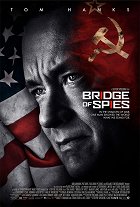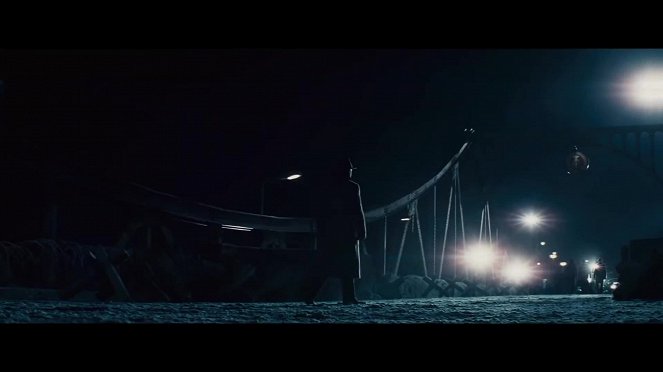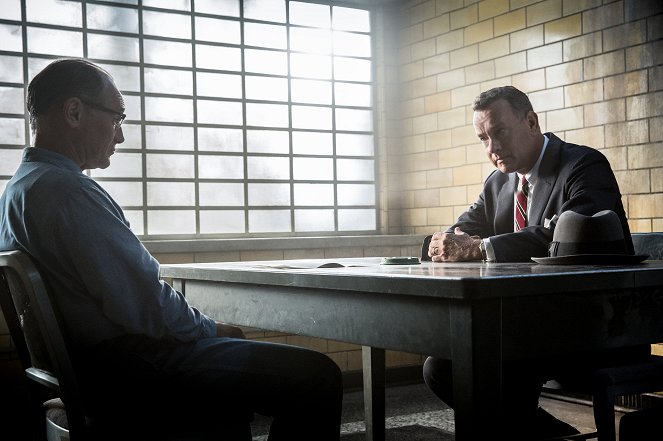Directed by:
Steven SpielbergCinematography:
Janusz KaminskiComposer:
Thomas NewmanCast:
Mark Rylance, Domenick Lombardozzi, Victor Verhaeghe, Brian Hutchison, Tom Hanks, Joshua Harto, Henny Russell, Alan Alda, John Rue, Billy Magnussen, Amy Ryan (more)VOD (2)
Plots(1)
Historical drama, set during the Cold War, directed by Steven Spielberg. When Rudolf Abel (Mark Rylance) sits down on a park bench in Brooklyn, New York, a secret message left for him causes the FBI to arrest him under suspicion of being a Soviet spy. When insurance lawyer James B. Donovan (Tom Hanks) is assigned to Abel's defence, he finds his new challenge increasingly difficult as the defendent refuses to co-operate. The cast also includes Amy Ryan, Alan Alda and Domenick Lombardozzi. (20th Century Fox Home Entertainment)
(more)Videos (14)
Reviews (13)
Bridge of Spies is a film about America, friendship despite the times and men who are just doing their jobs. Several decades ago, Hanks’s unassuming protagonist would probably have been played by Gary Cooper or James Stewart in a film directed by Frank Capra. As in Capra’s works, in Bridge of Spies American values are represented and defended by incorruptible individuals, not by unreliable institutions. At the same time, the quest for justice leads through so many obstacles and compromises that, at the end, instead of the joy of victory, there is a sense of relief that it’s over. (In addition to that, Spielberg again shows himself to be a master of suggestion and narrative shorthand in the climax, as he makes do with a very simple yet very telling shot of children climbing over a fence. In the context of the previously seen scaling of the Berlin Wall, unsettling cracks thus appear in the façade of the happy ending). ___ Donovan demonstrates his position outside of the system in both halves of the film by following his own rules of the game. He doesn’t act in the way that the people who have given hin his orders think he should act. His concept of justice is not subject to the anti-communist panic, and he makes fun of espionage work (“You know, spy stuff”), not giving it the degree of importance that you would expect from the protagonist of a spy thriller (interrupting a dialogue about the next course of action by telephoning his wife, with whom he sorts out what kind of jam he should bring her from the “fishing trip”). I see as the main screenwriting contribution of the Coen brothers, who, despite all their respect for classic Hollywood, never quite took it entirely seriously (just wait until the premiere of Ave, Caesar! for more compelling evidence) in their subversion of the exaggerated seriousness of a courtroom drama or spy movie by intentionally or seemingly leaving out genre-typical characters and employing down-to-earth catchphrases (“Can we just call them the Russians and save time?”), whose timing demonstrates the intuition of the master. ___ As is customary with Spielberg, the protagonist will have to defend his actions not only to the general public, but also (and, in the end, especially) to his family. Though absent from the latter part of the film, Donovan’s family is both an important motivation of Donovan’s actions (his repeatedly expressed wish to return to the warmth and comfort of his home, which he at least recalls with a hearty breakfast at the Hilton in Berlin) and the source of his doubts as to whether he is a good father to his son and a good husband to his wife. ___ The film’s opening scene, in which we see three different versions of Vogel (live, reflected in a mirror and in a finished self-portrait), aptly introduces us to the world of spies alternating between multiple identities while creating false expectations about the perceptibility of Vogel’s intentions. It soon becomes clear that he is not only a man who maintains an icy calm in all circumstances, but also one of the narrative’s most direct and honourable characters. He even wins over Hanks’s attorney with his sincerity. The special affinity between the two men, who need and influence each other, is expressed in the Berlin part of the film through Hanks’s cold, which forces him to constantly wipe his nose, just as we previously saw the phenomenal Mark Rylance do. ___ The creation of parallels between the individual characters and storylines is one of the film’s strengths, contributing along with the spiral structure of the narrative to its cohesiveness and subverting the black-and-white view of history. The second half of the film (which actually begins exactly halfway through the runtime) is basically a variation on the first half, thanks to which we realise that the two parties to the conflict have more in common than they are willing to admit. The individual shots often respond to each other and, thanks to their smooth continuity, we don’t fall out of rhythm and our attention doesn’t waver. ___ I find it almost needless to praise in Bridge of Spies the elements with which most of Spielberg’s films excel – economical and comprehensible storytelling through imagery and careful management of the viewer’s attention (largely without manipulating emotions – the film is unusually sparing in its use of music, using it for the first time after almost half an hour). Spielberg prepares us in advance with a musical motif, among other things, for the espionage plot, which does not fully take off until the second half of the narrative (the absence of exposition causes the storyline with the suddenly appearing economics student to seem clumsy) and alerts us to what we should pay attention to (“...whether they will embrace me or just put me in the back seat”). He expresses the dominance of one character or the other by their position in the shot, illustrates the thought process or the rebuttal of an argument with a counter-argument through appropriate camera movement, and completes the atmosphere with different colourways for the (warmer) West and the (almost colourless) East. Though 90% of Bridge of Spies consists of scenes in which two old men sit at a table and converse at length, it is every bit as gripping and suspenseful from start to finish as films based on ceaseless action (such as Mad Max). 85%
()
(less)
(more)
The most characteristic Steven Spielberg film in decades. No side is black and white, the main character played by the perfect Tom Hanks has increasingly clear human motivations amidst a thickening plot, and the technical aspects of the pivotal scenes (the plane, the wall, and ultimately all of Berlin) is so close and formally perfect that it takes your breath away. Despite the generous running time, you never get a moment to catch your breath, and every plot twist or complication forces me to spin my brain over and over again and think about how to maneuver out of the situation at hand. And that's where my only, yet all-encompassing, criticism is directed. Everything turns out exactly as I expected without knowledge of the given historical events. The painfully contemporary message reaches the viewer impressively, but there remains a feeling of being a bit shortchanged, which Steven brought on himself. In his hands, such a topic could not go wrong, but despite its formal perfection, it could have turned out even more sincerely.
()
Spielbergian contre-jour, elitism, perfect crowd scenes, liberalism, and Hanks' irritating Glabellar lines passing for acting. The comic-book differences between the Western and Eastern worlds (the snowy white-and-gray washed-out austerity of the Eastern Bloc with the leafy, vivacious sunshine of the West) unilaterally nods its head to the Statue of Liberty, as we'd expect from a Disney-Spielberg conglomerate, but the hero's opening struggle against all odds to ensure that the spy is entitled to not automatically have a rope around his neck in particular takes the patina off America's colorful godly foolishness. As you’d expect, the whole piece ultimately comes off as a heroization of the guardians of American values that must be cherished because humans alone are incapable of upholding those values.
()
I can't help it, but Spielberg simply showcases his classic, it's certain, but he doesn't add anything to it. Tom Hanks is incredible and thanks to him, you can manage this film quite easily. He plays a version of Captain America and he simply pulls it off. Americans are portrayed as good, of course, which bothers me a little, as well as the unnecessary pathos and the last fifteen minutes, which Spielberg should almost always cut out.
()
"Frankly, everyone else wants to put you in the electric chair." - "Ok." - "You don't look worried." - "Would that help?" Nobody makes movies like Steven Spielberg. The feeling of each shot being so eerily elaborate, yet looking so simple. The combining of ordinary human stories with extraordinary ones. The art of lightening dramatic moments with subtle humor without in any way demeaning them. In short, precision, perfection. And those memorable scenes (of all kinds) - the opening surveillance and arrest, the judge tying his bow tie, Powers' shooting down, the building of the Berlin Wall, the bargaining at the Soviet embassy, the breathtaking handover on the Glienitz Bridge... But, of course, all this is also a credit to the Coen brothers' script, Janusz Kamiński's cinematography and the actors. The fantastic Tom Hanks properly enjoys his "hardy man", and the unassuming Mark Rylance is no worse. I also really liked Thomas Newman's score - if he blew off Spectre for Bridge of Spies, I'm happy to forgive him for the bland Bond film.
()


